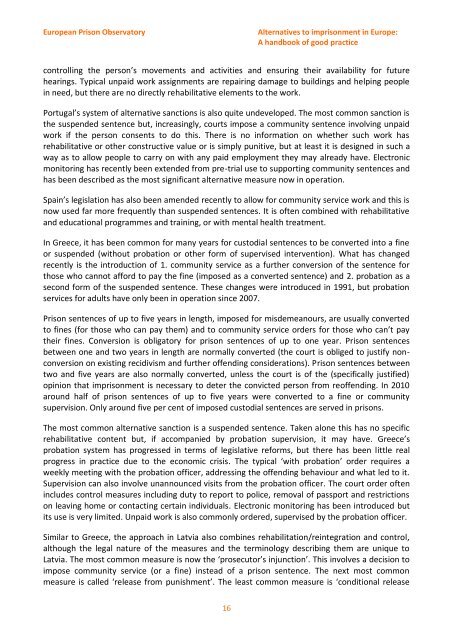good practice
Alternatives%20to%20imprisonment%20in%20Europe
Alternatives%20to%20imprisonment%20in%20Europe
Create successful ePaper yourself
Turn your PDF publications into a flip-book with our unique Google optimized e-Paper software.
European Prison Observatory<br />
Alternatives to imprisonment in Europe:<br />
A handbook of <strong>good</strong> <strong>practice</strong><br />
controlling the person’s movements and activities and ensuring their availability for future<br />
hearings. Typical unpaid work assignments are repairing damage to buildings and helping people<br />
in need, but there are no directly rehabilitative elements to the work.<br />
Portugal’s system of alternative sanctions is also quite undeveloped. The most common sanction is<br />
the suspended sentence but, increasingly, courts impose a community sentence involving unpaid<br />
work if the person consents to do this. There is no information on whether such work has<br />
rehabilitative or other constructive value or is simply punitive, but at least it is designed in such a<br />
way as to allow people to carry on with any paid employment they may already have. Electronic<br />
monitoring has recently been extended from pre-trial use to supporting community sentences and<br />
has been described as the most significant alternative measure now in operation.<br />
Spain’s legislation has also been amended recently to allow for community service work and this is<br />
now used far more frequently than suspended sentences. It is often combined with rehabilitative<br />
and educational programmes and training, or with mental health treatment.<br />
In Greece, it has been common for many years for custodial sentences to be converted into a fine<br />
or suspended (without probation or other form of supervised intervention). What has changed<br />
recently is the introduction of 1. community service as a further conversion of the sentence for<br />
those who cannot afford to pay the fine (imposed as a converted sentence) and 2. probation as a<br />
second form of the suspended sentence. These changes were introduced in 1991, but probation<br />
services for adults have only been in operation since 2007.<br />
Prison sentences of up to five years in length, imposed for misdemeanours, are usually converted<br />
to fines (for those who can pay them) and to community service orders for those who can’t pay<br />
their fines. Conversion is obligatory for prison sentences of up to one year. Prison sentences<br />
between one and two years in length are normally converted (the court is obliged to justify nonconversion<br />
on existing recidivism and further offending considerations). Prison sentences between<br />
two and five years are also normally converted, unless the court is of the (specifically justified)<br />
opinion that imprisonment is necessary to deter the convicted person from reoffending. In 2010<br />
around half of prison sentences of up to five years were converted to a fine or community<br />
supervision. Only around five per cent of imposed custodial sentences are served in prisons.<br />
The most common alternative sanction is a suspended sentence. Taken alone this has no specific<br />
rehabilitative content but, if accompanied by probation supervision, it may have. Greece’s<br />
probation system has progressed in terms of legislative reforms, but there has been little real<br />
progress in <strong>practice</strong> due to the economic crisis. The typical ‘with probation’ order requires a<br />
weekly meeting with the probation officer, addressing the offending behaviour and what led to it.<br />
Supervision can also involve unannounced visits from the probation officer. The court order often<br />
includes control measures including duty to report to police, removal of passport and restrictions<br />
on leaving home or contacting certain individuals. Electronic monitoring has been introduced but<br />
its use is very limited. Unpaid work is also commonly ordered, supervised by the probation officer.<br />
Similar to Greece, the approach in Latvia also combines rehabilitation/reintegration and control,<br />
although the legal nature of the measures and the terminology describing them are unique to<br />
Latvia. The most common measure is now the ‘prosecutor’s injunction’. This involves a decision to<br />
impose community service (or a fine) instead of a prison sentence. The next most common<br />
measure is called ‘release from punishment’. The least common measure is ‘conditional release<br />
16





